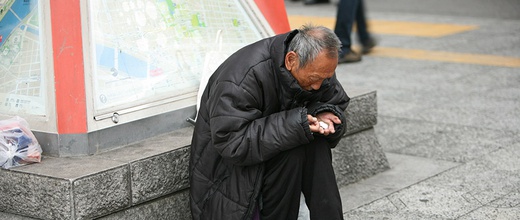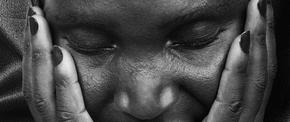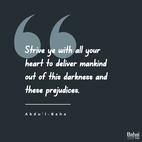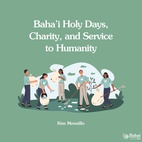The views expressed in our content reflect individual perspectives and do not represent the official views of the Baha'i Faith.
I grew up in the United States, but I now live in South Africa—which has been a blessing in many ways.
The beauty of the South African people, their resilience and open hearts despite the consistent struggles afflicting the majority has taught me a lot about patience, long-suffering and strength. Despite the many blessings of living in this nation, so full of potential, the extremes of wealth and poverty gnaw at me daily.
I am blessed to live on a beautiful property in a green, clean, well-serviced neighborhood. However, five minutes away, alongside the highway, an informal settlement exists, made of corrugated iron, patched pieces of plastic, chip wood and anything those desperate for shelter have managed to put together. No one takes away the rubbish which accumulates there, and it flies around in the breeze until it is swept into the gutters during a rain; the same rain that threatens the integrity of these haphazard homes that often fill with mud, or leak, or completely collapse after a big storm.
As I sit warm and safe behind the walls of my well-built home, I struggle to enjoy snuggling up with a good book and cup of tea. My mind constantly wanders to those frantically trying to secure their roof, enforce their walls and fear for their safety and their ability to keep their children warm and dry.
The Baha’i teachings call on all those blessed with material comfort:
O ye rich ones on earth! The poor in your midst are My trust; guard ye My trust, and be not intent only on your own ease. – Baha’u’llah, The Hidden Words, p. 41.
Yes, some of those who have material comfort don’t consider themselves rich. But if you do not worry how you are going to feed your children or how you are going to stay warm; and if you find yourself planning to get together at a café for a meal with a friend; or you’ve recently purchased new décor for your home, you are rich compared to the majority of the people around you who don’t have the time or the resources for such niceties in their daily struggle for survival.
So the question becomes what can we “rich ones” do?
In South Africa the unemployment rate sits at 40%, and about 50% of employed people still live below the poverty line—so employers and people in positions of power can begin to make a shift. If you employ someone, ask yourself: is the wage I pay my employee perpetuating their poverty?
I have recently been trying to help housekeepers find jobs. I have been screening potential employers. I am ashamed to find people wanting to offer full-time positions for as little as R 1800 (about $153 in U.S. dollars) a month. These same people themselves typically make salaries between R 15-70,000 (approximately $6000) per month.
So it needs to be said: if you offer slave wages, you perpetuate the poverty epidemic and compromise your spiritual integrity!
It is simple—if you cannot afford to pay someone a fair wage, pay them a fair wage for as many days as you can afford to do so. This will allow them to find work during the other days! For example, if your budget is R 1800 for housekeeping, that means you can afford to pay someone to work 10 days a month, not Monday through Friday. Paying anyone less than R 20 ($1.70) an hour in South Africa only takes advantage of people in desperate situations.
The job of anyone who wants to maintain good values and spiritual, emotional and mental health is to care for the less fortunate.
We all just need to ask ourselves, what can we do to empower those who struggle? How can we give them agency, let them know their opinions, hard work and skills are valued and respected? How can we do better?
We know that when people feel respected and are treated fairly, poverty dissipates. When people are not honored and remunerated justly for their work, not only do they continue to live in poverty and become aggrieved and belittled, but those treating them unjustly become spiritually poor as well.
Even if an unjust employer has every worldly possession, they really have nothing. True wealth comes from sharing, from being kind and generous and happy. When I visit the township, I am always touched to see how people share what they have, even if they have very little. We can learn a great deal from those who are used to struggling. Mostly, we can learn to practice compassion and generosity:
O Children of Dust! Tell the rich of the midnight sighing of the poor, lest heedlessness lead them into the path of destruction, and deprive them of the Tree of Wealth. To give and to be generous are attributes of Mine; well is it with him that adorneth himself with My virtues. – Ibid,. p. 39.
The golden rule that we all know so well also reminds us of this crucial message, regardless of what religious tradition we follow,
So if you feel you deserve paid vacations, sick leave, a reasonable yearly increase and a living wage, be sure to offer the same to your fellow human beings. If you cannot afford to pay a fair wage, do the work yourself.
If we choose to ignore this common decency, we degrade ourselves and others and become spoiled and entitled. This will never lead to true happiness. Only equality, mutual respect and uplifting the down-trodden can liberate us from the degradation brought by greed and selfishness.
If we can establish such ethical practices, we all become rich, and the extremes of wealth and poverty will begin to fade—because we will not desire so much while others have so little.

















Comments
Sign in or create an account
Continue with Facebookor